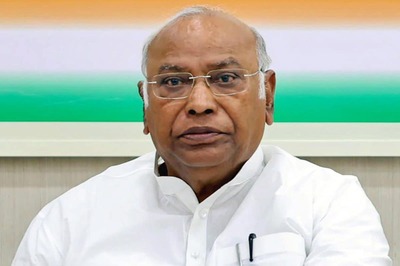
views
The Indian housing sector did reasonably well in 2022. This is because residential property sales increased in 2021, post the Covid-induced lull in 2020, and continued their stint in 2022 too. Many real estate consultants have even expressed their surprise at how quickly this sector recovered from the effect of Covid-19 and surpassed all expectations despite the RBI having increased the repo rate by 225 basis points from April 2022 to December 2022.
Residential property sales hit an all-time high in 2022. This has led many people to anticipate that the housing sector would do well in 2023 too. However, home loan borrowers are also concerned about the effect of repetitive repo rate hikes on floating-rate loans such as home loans. The economic disruptions caused due to geopolitical tensions and the sudden surge in the number of Covid-19 cases across the world have had an impact on India as well. Monetary policy tightening in the US and India harmed supply chains and raised the cost of construction raw materials, thus, resulting in inflated housing prices. With inflation showing its impact on the prices of daily necessary items and the fear of recession rebounding post the news of recent skirmishes between different countries, further rate hikes by the RBI cannot be ruled out. Homebuyers are currently hoping that Finance Minister Nirmala Sitharaman will provide some relief in the upcoming Union Budget 2023.
The forthcoming discussions on the budget would allow the government to address a variety of issues confronting the Indian housing sector in 2023 and beyond. The budget could include opportunities via exemptions and tax benefits to help boost the housing industry sector. Some of these include:
Added support for those seeking affordable housing
In recent years, the government has prioritised affordable housing, and its expansion is dependent on a variety of incentives and policy provisions. The budget could include increased funding for the Pradhan Mantri Awas Yojana, a government programme that provides affordable housing to the urban and rural poor. Apart, it could announce the much-needed tax breaks for developers who build affordable housing projects.
Ease land acquisition
The country has been functioning on archaic laws since its independence. There is a need to do away with impractical rules and lay the groundwork to simplify complicated laws. The difficulty of acquiring land for development has confounded the housing sector long enough. To streamline the land acquisition process, the budget could simplify procedures for obtaining land titles, for example. Offering financial assistance to affordable housing developers for land acquisition would be another step in the right direction.
Announce tax incentives
Under Section 24 of the Income-tax Act of 1961, homebuyers can currently claim an income tax deduction for the interest paid on their home loan. There has been no change in the maximum deduction limit since 2016-17. For a self-occupied property, the maximum deduction that can be claimed is Rs 2 lakh per fiscal year.
Investors and home buyers have been fervently seeking more tax breaks for the past many years. The Section 24 tax credit for housing loan interest should be increased to at least Rs 5 lakh. This will increase housing demand, particularly in the affordable segment.
The government has not done much to encourage people to invest more in real estate. This begets the need to offer incentives or come out with investor-friendly schemes that would encourage more people to allocate a greater part of their earnings to real estate. The interest rates on loans have gone up in the same proportion as the prices of residential properties. Inflation has reared its ugly head from time to time, thus, heightening real estate prices, thus, underlining the need to enhance tax benefits.
Introduce tax deduction on principal repayment of housing loans as an added benefit
Under Section 80C of the Income Tax Act, homebuyers can also claim income tax deductions on the principal repayment of their home loan. The maximum deduction that can be claimed per fiscal year is Rs 1.5 lakh. However, there are other deductions too like Public Provident Fund, equity-linked savings schemes, life insurance premiums and Sukanya Samriddhi Account investments under Section 80C of the Act. Home loan borrowers would be a lot relieved if the government either increases the tax deduction limit under Section 80C or introduce the tax deduction on principal repayment of housing loans as a separate benefit. Apart, increased tax deductions for home loans will offset the increased EMI burden and leave some surplus to spend, stimulating the Indian economy.
Easing capital gains standards to support home buyers
Long-term capital gains from the sale of an existing home can be used to buy or build a new home under Section 54 of the Income Tax Act. If the exemption is claimed through a semi-constructed property, it can only be claimed if the property is completed within three years of the sale of the previous house. Apart, the government must remove the cap of Rs 2 crores on capital gains for reinvesting in more than one property.
The idea of residential properties has changed a lot in the past many years. Residential projects are becoming increasingly large and complex in terms of amenities, designs and look. The completion of work on such properties may mandate a timeline exceeding three years. Considering how the execution of RERA guidelines has resulted in an improvement, real estate builders need more time to work on those semi-constructed projects. This makes it difficult for homebuyers to deduct capital gains on under-construction properties. It would be worthwhile if the time needed to complete real estate projects is extended to five years as opposed to the current timeline of three years.
Many people harbour the wish to buy their own homes. However, rigid laws and age-old taxation rules have always been more of a hindrance than an aid. It’s time to get rid of those redundant and irrelevant regulations. The old must give way to the new.
(The author is the CEO and co-founder of BASIC Home Loan)




















Comments
0 comment